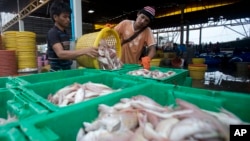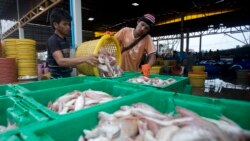Illegal and fraudulent seafood is threatening the world’s fisheries, food security, economic welfare and even people’s health. The financial stakes are high, with billions of dollars lost each year to illegal, unreported, and unregulated fishing. So too are the human stakes. Fish and seafood are a key source of protein for almost 3 billion people around the world. And hundreds of millions of people depend on fishing and fish farming for their livelihoods.
Illegal and unregulated fishing is a global problem. It happens when people break the rules or misreport their catch, or undermine international measures to conserve our shared resources. The catch may be mislabeled and even misidentified as different species.
As the second largest market for imported seafood, the United States plays a key role in supporting sustainable fishing. This is why a special task force set up by President Barack Obama has developed a plan to step up the fight against illegal fishing and seafood fraud. The plan is built on partnerships -- among the U.S. government, our stakeholders, and our foreign partners -- to strengthen enforcement and improve the flow of information along the supply chain.
At its heart is a new seafood traceability program. All seafood sold in the U.S. will eventually require basic information on what it is, where it was produced, and who caught it. This will ensure the seafood can be traced to its source and is honestly labeled.
The plan also calls for new actions at the international level, starting with the United States formally joining the Port States Measures Agreement. This international treaty will prevent illegally caught fish from entering the global market through ports around the world. We will seek commitments from at least 14 more nations to join the agreement. We will also work with our development partners and other countries to promote best practices for sustainable and legal fishing.
American consumers and fishermen will benefit greatly from the plan, yes, but by leveling the playing field in the international seafood industry, others around the world will too. The losers will be those who break the rules, who deplete the world’s fish stocks and fraudulently sell their catch.
From providing food to generating income to keeping marine ecosystems healthy, fish are an indispensable natural resource. Our nation is committed to improving fisheries management, protecting the ocean, and safeguarding our shared marine resources for generations to come.














